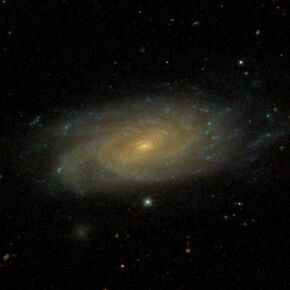Astronomy:NGC 1090
From HandWiki
Short description: Galaxy in the constellation Cetus
| NGC 1090 | |
|---|---|
 SDSS image of NGC 1090 | |
| Observation data (J2000 epoch) | |
| Constellation | Cetus |
| Right ascension | 02h 46m 33.9s[1] |
| Declination | −00° 14′ 49″[1] |
| Redshift | 2760 ± 4 km/s[1] |
| Distance | 124 million light-years[2] |
| Apparent magnitude (V) | 12.5[1] |
| Characteristics | |
| Type | SB(rs)bc[1] |
| Apparent size (V) | 4.0′ × 1.7′[1] |
| Other designations | |
| UGC 2247,[1] PGC 10507[1] | |
NGC 1090 is a barred spiral galaxy located in the constellation Cetus.
NGC 1090 has a pseudo inner ring. The disc has a very low surface brightness.
This galaxy has been the site of two known supernovae: SN 1962K and SN 1971T.[3]
NGC 1090 is not part of a galaxy group, even though it appears close to NGC 1087, M-77 (NGC 1068), NGC 1055, NGC 1073, and five other small irregular galaxies.
The distance to NGC 1090 is approximately 124 million light years and its diameter is about 144,000 light years.[2]
References
- ↑ 1.0 1.1 1.2 1.3 1.4 1.5 1.6 1.7 "NASA/IPAC Extragalactic Database". Results for NGC 1090. http://nedwww.ipac.caltech.edu/.
- ↑ 2.0 2.1 Bratton, Mark (2011). The Complete Guide to the Herschel Objects. Cambridge University Press. p. 166. ISBN 978-0-521-76892-4. https://archive.org/details/completeguidetoh00brat.
- ↑ "List of Supernovae". Central Bureau for Astronomical Telegrams. Harvard University. http://www.cbat.eps.harvard.edu/lists/Supernovae.html.
External links
- NGC 1090 on WikiSky: DSS2, SDSS, GALEX, IRAS, Hydrogen α, X-Ray, Astrophoto, Sky Map, Articles and images
Coordinates: ![]() 02h 46m 33.9s, −00° 14′ 49″
02h 46m 33.9s, −00° 14′ 49″
 |

